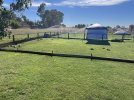Hi everyone. Jordan is being effected by a heatwave like never before since decades. temperature reaches 43 degrees C in Amman during the day. (That's 109.4 degrees F). Boiling hot weather. Moreover, the Govt has declared a state of emergency due to weather conditions.
I'd like to ask: if tortoises are cold-blooded they should not be so "frustrated"- so as to say - by such hot weather. However, I have recently noticed that Oli has become extremely inactive during Summer, and I would like to ask WHY? He remains in deep sleep till I wake him up, give him a nice warm soak, after which he eats. Once he finishes eating, he falls asleep till the next day. At times I wake him up again so as to give him a second soak.
The matter has been worrying me a lot.
I would appreciate your help/advice.
Thank you.
I'd like to ask: if tortoises are cold-blooded they should not be so "frustrated"- so as to say - by such hot weather. However, I have recently noticed that Oli has become extremely inactive during Summer, and I would like to ask WHY? He remains in deep sleep till I wake him up, give him a nice warm soak, after which he eats. Once he finishes eating, he falls asleep till the next day. At times I wake him up again so as to give him a second soak.
The matter has been worrying me a lot.
I would appreciate your help/advice.
Thank you.
